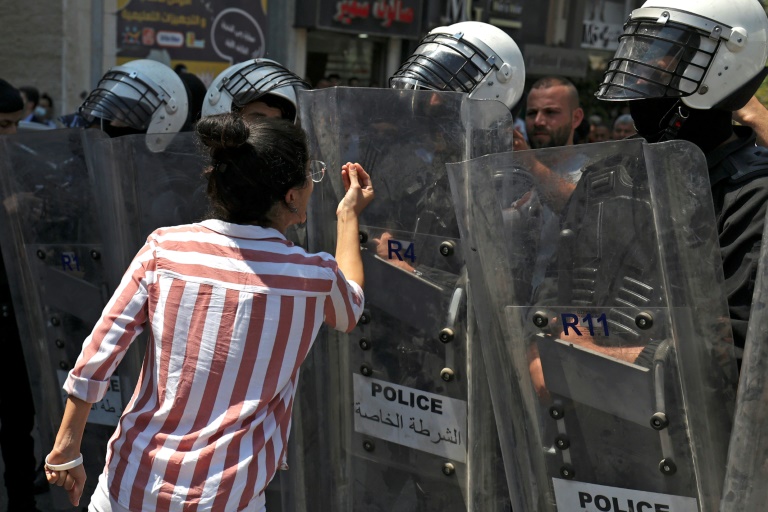A human rights activist and critic of the Palestinian Authority died Thursday after security forces stormed his house and violently arrested him, his family said, triggering angry protests in the occupied West Bank.
Nizar Banat’s family said he had been hit with an object used to break the window, in an incident that sparked outrage from fellow activists and calls for an investigation, including from the United Nations and European Union.
Banat, 43, from the flashpoint city of Hebron, was arrested early Thursday by Palestinian Authority (PA) security forces, Hebron governor Jibrin al-Bakri said.
“Following… a summons from the public prosecution to arrest citizen Nizar Khalil Muhammad Banat, a force from the security services arrested him,” Bakri said in a statement carried by the official WAFA news agency.
He did not cite a reason for Banat’s arrest.
Banat’s cousin, Hussein Banat, told AFP around 25 armed men had broken into the activist’s house at 3:30 am (0030 GMT) while he was sleeping, and used pepper spray to subdue him.
“A large force entered and aggressively took off all of his clothes, then beat him for eight minutes straight,” he said, with Banat then dragged to a vehicle and driven away.
The governor said that during Banat’s arrest, “his health deteriorated”, and he was taken to hospital, where “after he was examined by doctors, he was pronounced dead”.
Samir Abu Zarzour, the doctor who carried out the autopsy, told journalists that injuries on Banat’s body indicated he had been beaten on the head, chest, neck, legs and hands.
Less than an hour elapsed between his arrest and his death, Abu Zarzour told reporters in Ramallah.
– ‘Enough is enough’ –
Banat was known for his videos posted on Facebook, in which he denounced alleged corruption in the PA.
He had registered as a candidate in Palestinian parliamentary elections, which had been set for May until president Mahmud Abbas postponed them indefinitely.
Two months ago, Banat had said his house had been shot at by unknown attackers.
Bakri and prime minister Mohammad Shtayyeh said an investigation had been launched into his death.
Approached by AFP, Palestinian security forces declined to comment.
On Thursday some 300 people gathered in Ramallah, the seat of the PA, calling for Abbas to quit, as well as in Banat’s hometown of Hebron.
“Abbas, go!” they chanted, brandishing portraits of Banat.
Security forces fired tear gas, and one protester was hit in the face with a canister and hospitalised.
“Enough is enough,” protester Sameh Abu Awwad said in Ramallah, describing Banat as a man who had “not hesitated to speak the truth, whatever the cost”.
Palestinian Islamist movement Hamas, which controls the Gaza Strip, said it held president Abbas “fully responsible for the repercussions” of Banat’s death.
UN Middle East peace envoy Tor Wennesland said he was “alarmed and saddened” at Banat’s death, and that the “perpetrators must be brought to justice”.
The European Union, one of the biggest donors to the PA, said it was “shocked and saddened” by the incident and called for a “full, independent and transparent investigation”.
The EU had voiced concern last November after Banat was detained for four days, and again in May after Palestinian security forces raided his home.
Amnesty International said that “the fact that Nizar Benat died so soon after his shockingly brutal arrest raises serious alarm”.
– ‘Dark day’ –
Farid al-Atrash, from the Palestinian rights group the Independent Commission for Human Rights, said Banat’s death marked “a dark day in the history of the Palestinian people”.
On Tuesday, another Hebron-based Palestinian human rights activist, Issa Amro, said he was briefly detained by the PA after posting criticism of political detentions on Facebook.
An opinion poll published earlier this month by the Palestinian Center for Policy and Survey Research found that 84 percent of Palestinians believe the PA is corrupt.
The PA exercises limited powers over some 40 percent of the West Bank, occupied by Israel since the Six-Day War of 1967.
Israel, which controls all access to the territory and coordinates with the PA, directly administers the remaining 60 percent.











